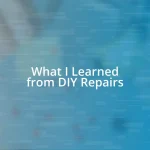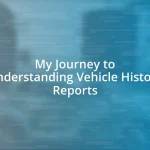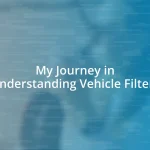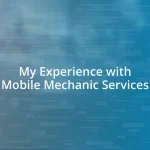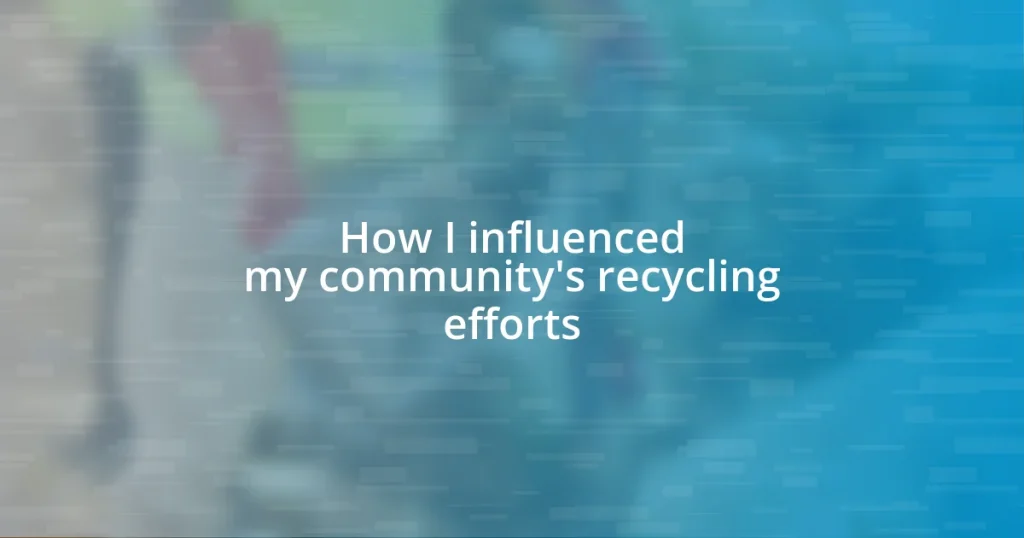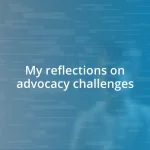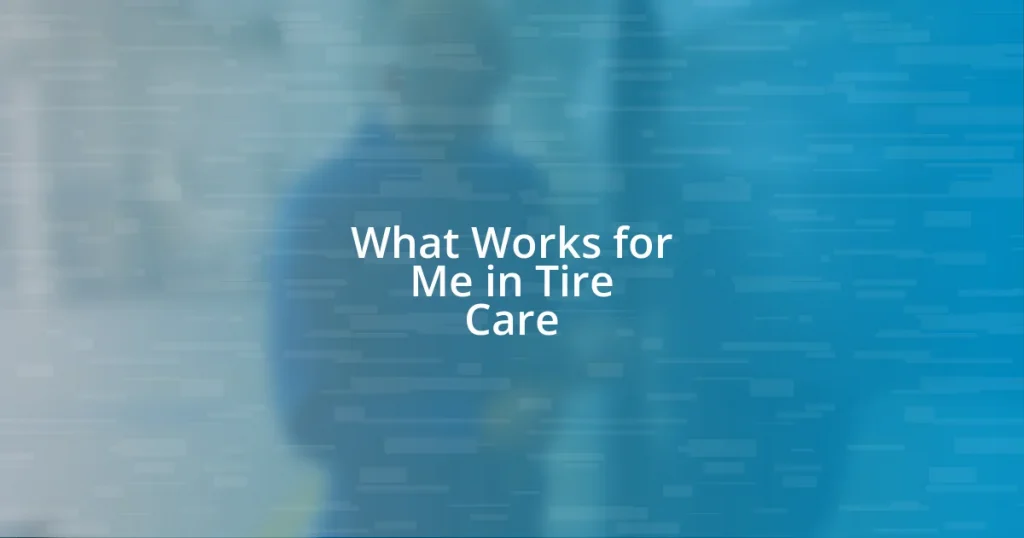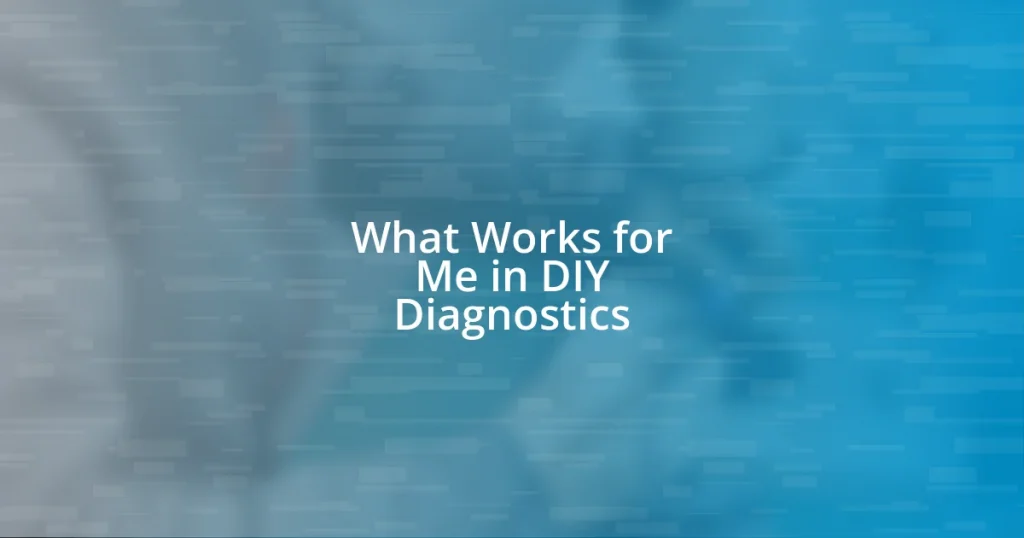Key takeaways:
- Engaged the community through conversations to identify recycling challenges, leading to clearer communication and increased participation.
- Developed a strategic plan that included clear guidelines, more accessibility, community workshops, and feedback mechanisms to enhance recycling efforts.
- Implemented ongoing engagement initiatives, such as workshops and fun events, to sustain interest and foster a sense of community ownership in recycling practices.
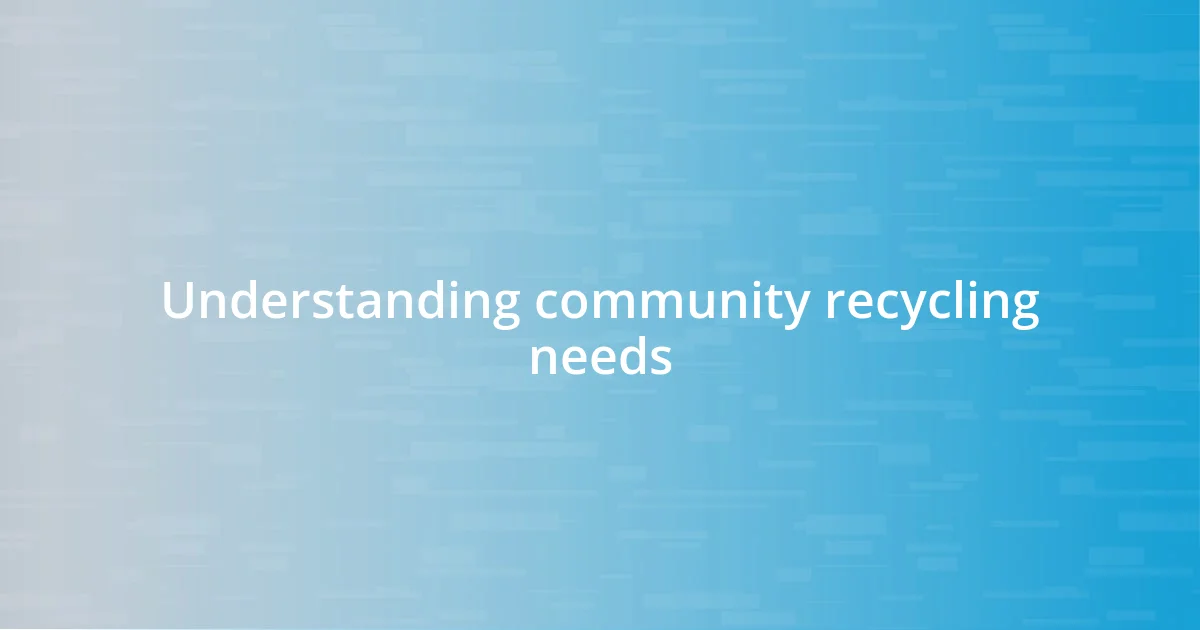
Understanding community recycling needs
To truly understand my community’s recycling needs, I took the time to engage with residents in casual conversations at local events. I quickly realized that many people felt overwhelmed by the complexity of recycling rules. Isn’t it frustrating when you want to do the right thing, but you feel lost on how to start?
One day, while volunteering at a neighborhood cleanup, I chatted with a mother who shared how her kids were eager to recycle but didn’t know what materials were accepted. This moment hit me hard; it wasn’t just about the adults but empowering the next generation. How can we empower our youth to be stewards of the environment if they don’t know where to begin?
I also discovered that our local recycling program lacked clarity in communication. Many people expressed confusion over acceptable items, which led to contamination in our recycling bins. It made me question: how can we make recycling a simpler, more engaging process? This realization pushed me to advocate for clearer guidelines, knowing that simplified actions lead to greater participation and impact.
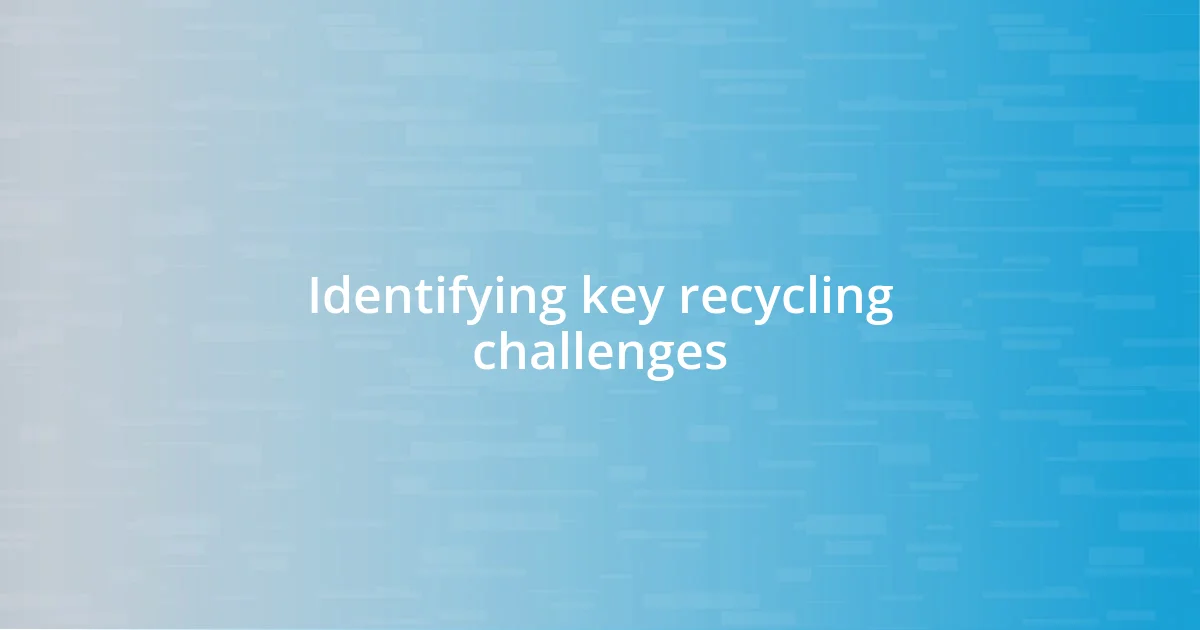
Identifying key recycling challenges
Identifying key recycling challenges is essential for creating effective initiatives. One major challenge I noticed was the inconsistent messaging regarding what can and cannot be recycled. At a community meeting, a resident shared her frustration about how different sources provided conflicting information, causing her to second-guess her recycling efforts. I felt a sense of urgency to help unify these messages so everyone could confidently participate in recycling.
Another significant barrier I encountered was the lack of convenient recycling options. During my weekly jogs around the neighborhood, I often found that not enough recycling bins were available in public spaces, which led to trash ending up in recycling containers. I can still recall the disappointment I felt seeing a brand new bottle just tossed away because there was no proper place for it. Making recycling more accessible is a critical element to incentivizing participation.
Lastly, community engagement plays a pivotal role in recycling rates. I remember organizing an educational booth at a local festival, where I provided hands-on demonstrations for families. The excitement was palpable, and I noticed how much people enjoyed learning about waste reduction in a fun and interactive way. This experience reminded me that fostering a sense of community ownership could tremendously impact the success of our recycling efforts.
| Challenges | Details |
|---|---|
| Inconsistent Messaging | Conflicting information leads to confusion and reduces participation. |
| Lack of Accessibility | Insufficient recycling bins in public spaces result in improper disposal. |
| Community Engagement | Interactive education fosters enthusiasm and empowers residents. |
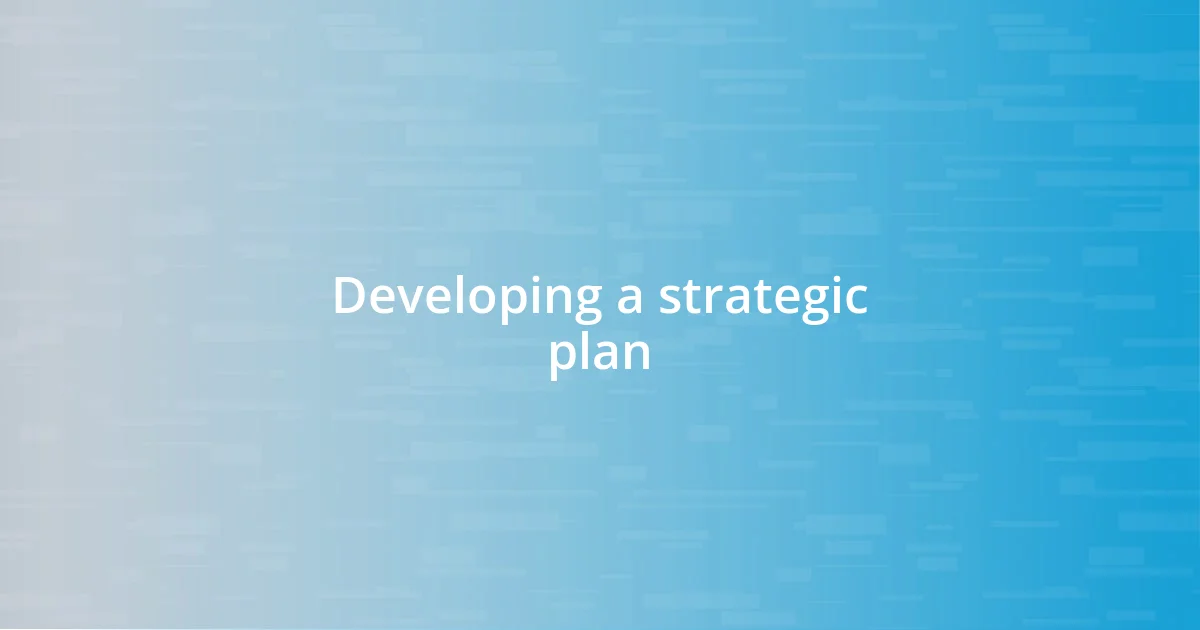
Developing a strategic plan

Developing a strategic plan
Creating a strategic plan for our recycling efforts felt like charting a course through uncharted waters. After gathering insights from my neighbors, I realized we needed a roadmap that addressed our unique challenges. I sat down with a few like-minded individuals over coffee, brainstorming actionable steps while sipping my favorite brew. The collaboration energized me, sparking ideas about community workshops and a centralized information hub.
Here’s a glimpse of what we included in our strategic plan:
– Clear Communication: Establish a shared platform for accurate recycling guidelines accessible to everyone.
– Increased Accessibility: Collaborate with local authorities to place more recycling bins in high-traffic areas.
– Community Events: Host fun, hands-on recycling events to engage residents and motivate them to participate.
– Feedback Mechanisms: Create easy channels for residents to share their experiences and suggestions, ensuring their voices are heard.
This plan became a living document, evolving with the community’s needs and feedback. Each step felt like a small victory, and it made me reflect on how collective action truly shapes our environment. I remember my excitement after our first community workshop; seeing families animatedly discussing recycling options filled me with hope. It reaffirmed my belief that when we work together, we can create meaningful change.
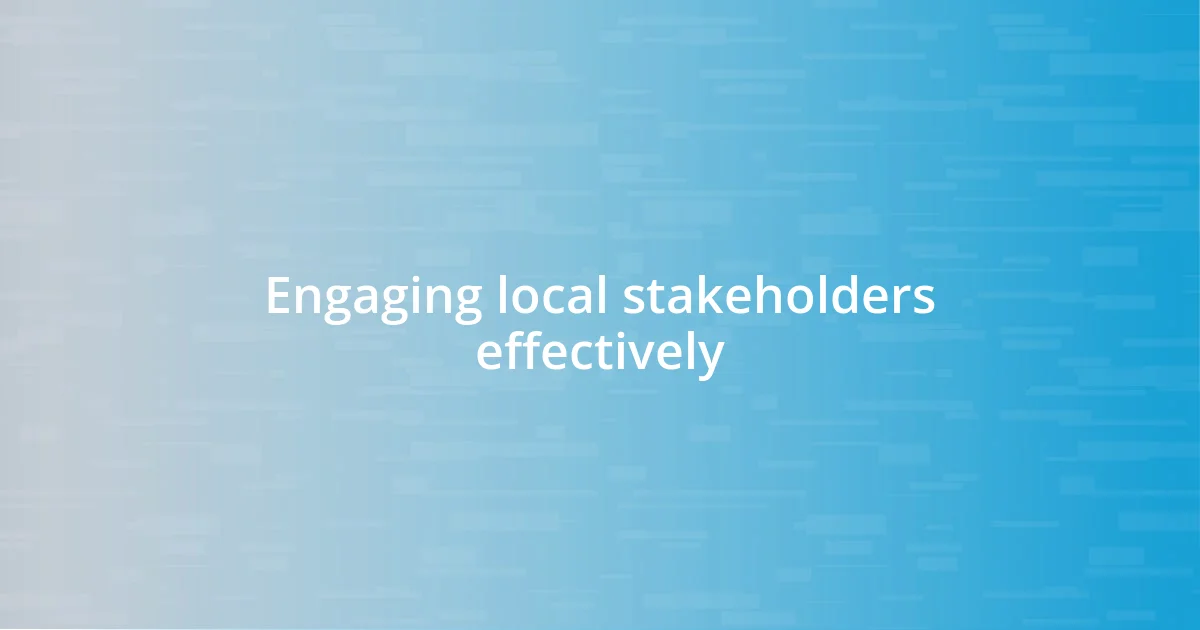
Engaging local stakeholders effectively
Engaging local stakeholders effectively requires building genuine relationships and cultivating trust. I remember one neighborhood clean-up event where I didn’t just invite residents; I took the time to have one-on-one conversations with them about recycling’s importance. It struck me how those small, personal interactions ignited their interest. When stakeholders feel valued and heard, they’re more likely to invest in the initiative, transforming passive participants into passionate advocates.
Another technique that proved invaluable was creating diverse forums for discussion. I once organized a roundtable with local businesses, schools, and community leaders. We explored our shared responsibility in enhancing recycling efforts, and hearing different perspectives opened my eyes to new possibilities. Has anyone else experienced that “aha” moment when a fresh idea clicks into place? This exchange of ideas illuminated pathways to collaborate, which not only strengthened our ties but also enriched our solution toolkit.
Throughout this journey, I learned that maintaining open lines of communication is crucial. After we launched a Facebook group dedicated to recycling updates and discussions, it became a vibrant hub for information and support. I was pleasantly surprised by how quickly residents began sharing tips and experiences, creating a ripple effect of enthusiasm. Wouldn’t it be wonderful to see that momentum continue? Keeping everyone involved and informed not only fosters a sense of community but also empowers everyone to take ownership of our local recycling efforts.
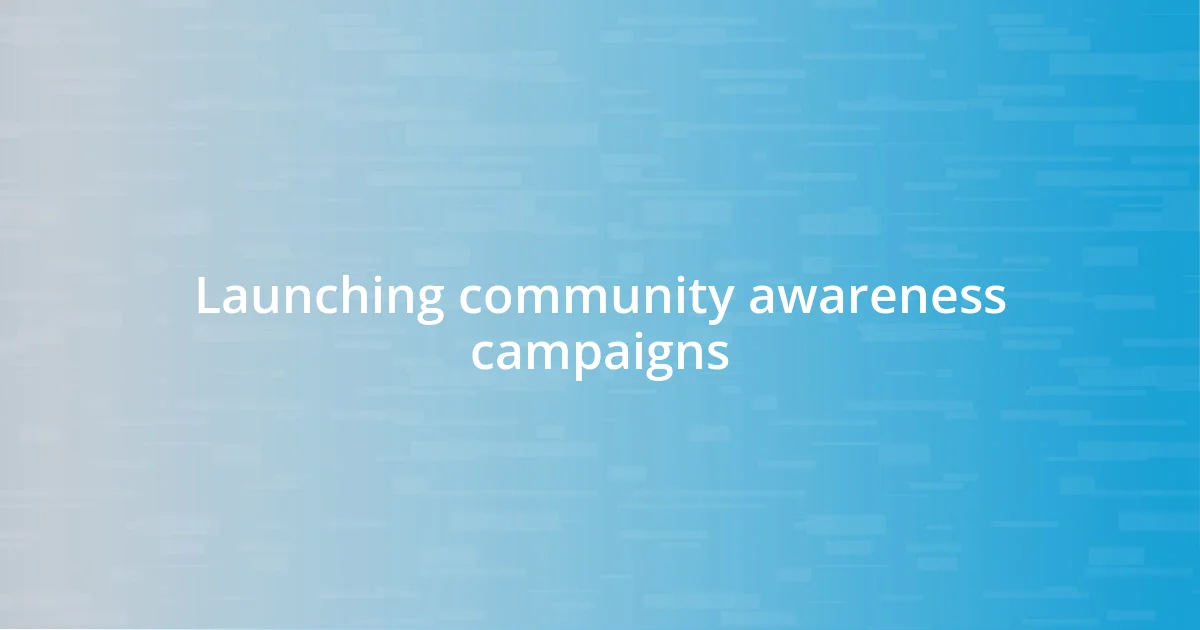
Launching community awareness campaigns
When launching community awareness campaigns, I found that personal storytelling becomes a powerful tool. At one of our first events, I shared a simple yet impactful story about my family’s recycling journey. I described how integrating recycling into our daily routine not only cleared our space but also sparked conversations about sustainability among our kids. Seeing nods of recognition in the audience made me realize that shared experiences can resonate deeply; it’s not just about facts, but about connecting on a human level.
The use of visual aids really transformed our outreach efforts. I vividly remember creating colorful posters highlighting the benefits of recycling, adorned with images of local wildlife and sparkling landscapes. It seemed to capture the community’s attention at a deeper emotional level. Have you ever noticed how images can spark enthusiasm? A neighbor approached me, inspired to organize an art competition for local children based on recycling themes. This idea blossomed into a community project where we showcased student art around town, expanding our message organically while celebrating creativity and involvement.
Engagement doesn’t end with just spreading the word; it’s about fostering ongoing dialogues. I set up a booth at our local farmers’ market, offering recycling tips while also inviting people to share their thoughts. I recall one elderly woman who shared her frustrations about the lack of accessible recycling services. Listening to her plight, I felt a renewed sense of responsibility—it was clear that community awareness also hinges on addressing gaps in service and ensuring every voice is counted. This exchange not only informed our future campaigns but reinforced the notion that awareness starts with listening.
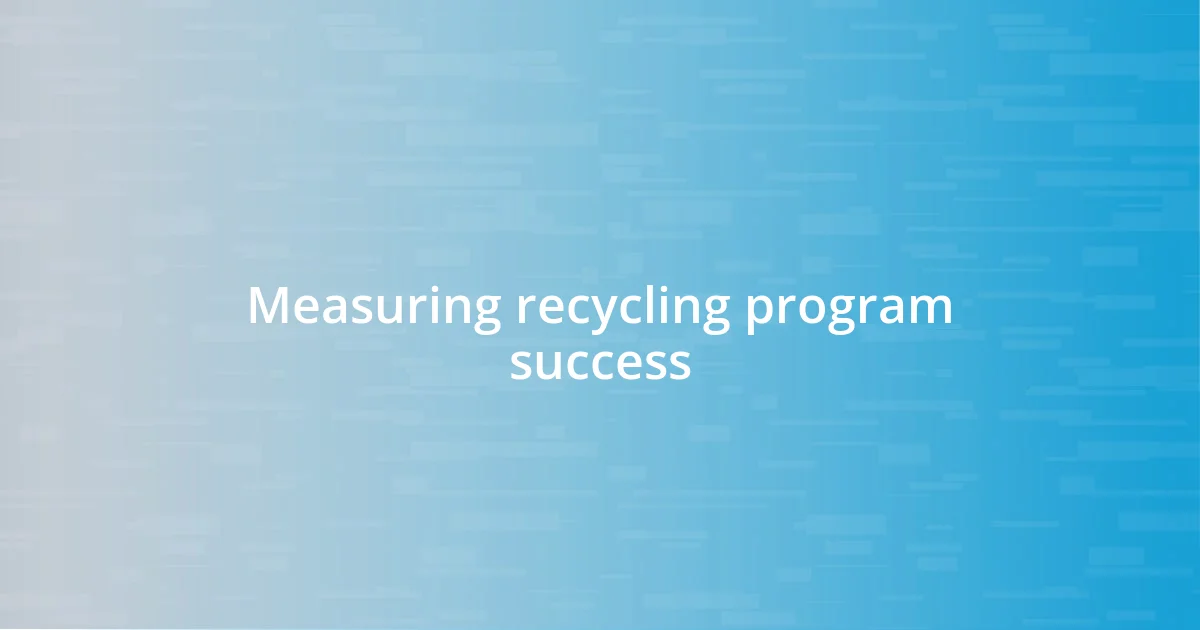
Measuring recycling program success
Measuring the success of our recycling program became a vital aspect that shaped its growth. I remember attending a workshop on metrics and assessment, where I learned about tracking participation rates as an indicator of engagement. It was eye-opening to realize how simply counting the number of recycling bins used could provide insights into community behavior. Have you ever thought about how numbers can tell a story?
Another significant measure involved assessing the quality of the materials being recycled. I distinctly recall the day we arranged for a “recyclables audit” at our local drop-off center. The results were enlightening—seeing how contaminated materials impacted the overall recycling process really hit home. It prompted me to think, what good is participation if the effort is wasted? We initiated follow-up workshops to educate the community on proper recycling practices, and it felt rewarding to see those efforts reflected in cleaner, more efficient recycling streams.
Lastly, surveying community satisfaction proved invaluable. I remember designing a simple online questionnaire to gauge people’s feedback—questions about their recycling habits and barriers they faced. When I read their responses, I felt an overwhelming sense of connection. People were eager to share their challenges, and it was heartwarming to know that their input could actually drive change. It prompted me to ask: How else can we empower our community to feel invested in this ongoing journey? Each of these measures not only painted a complete picture of our recycling efforts but also inspired more meaningful participation.
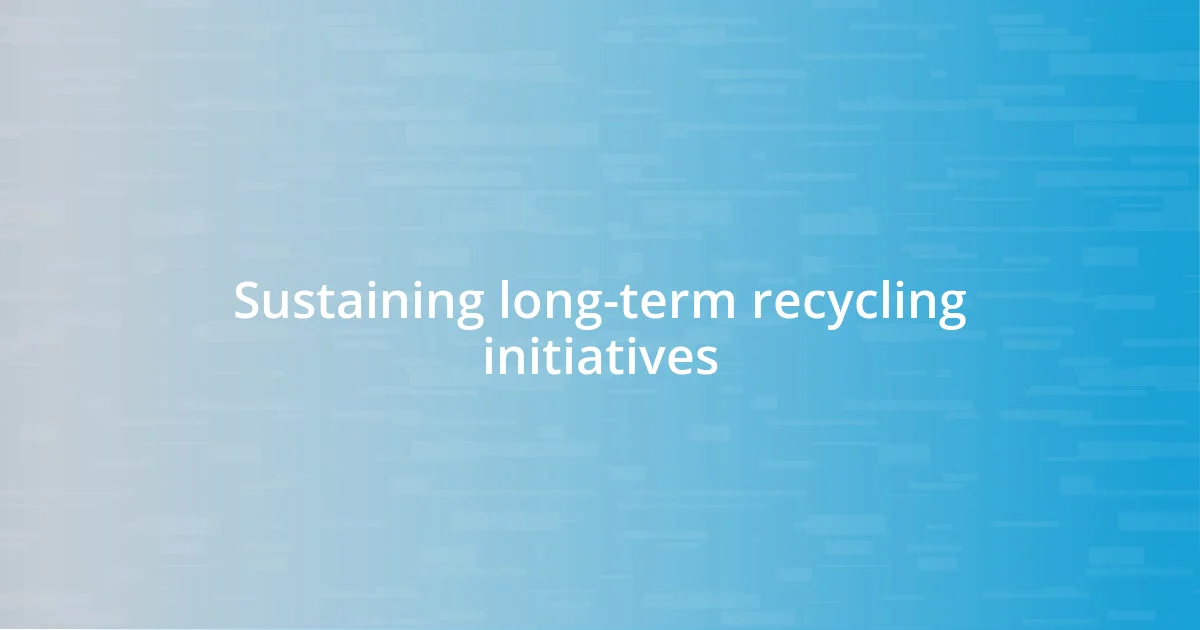
Sustaining long-term recycling initiatives
Sustaining long-term recycling initiatives hinges on consistent community engagement and education. I vividly recall our first recycling workshop, where I saw families genuinely excited to learn about composting and how it could reduce waste. The joy in their eyes as they gathered tips for turning food scraps into rich soil reminded me why we embarked on this journey. It made me wonder, how can we keep that enthusiasm alive?
Regular events became crucial in maintaining momentum. One Saturday, we organized a “Recycling Olympics,” where neighbors competed in fun challenges around sorting materials correctly. I was amazed at the competitive spirit that unfolded—it was both entertaining and educational. Seeing kids cheer for their parents while they raced against the clock made me think, isn’t recycling more enjoyable when it feels like a team effort? Such initiatives not only strengthened our community bonds but kept the recycling message front and center.
Lastly, incorporating feedback loops into our initiatives proved essential. I started a monthly coffee gathering where residents could share successes and challenges they faced with recycling. I remember one candid conversation about a lack of resources for recycling electronic waste. This sparked an idea to partner with local tech companies for a collection drive. Each conversation uncovered new opportunities for collaboration and growth, solidifying our commitment to a sustainable future. How often do we take the time to listen and adapt our strategies accordingly? This simple act can make all the difference in sustaining long-term efforts.





